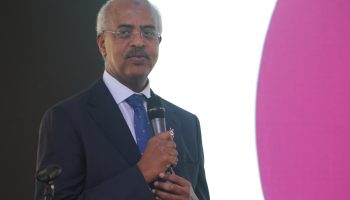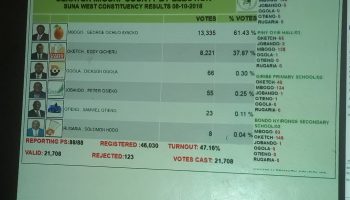- June 3, 2019
- Posted by: p mulee
- Category:
Deputy President William Ruto’s allies have welcomed the government’s move to recall all currency notes, saying this would debunk claims that they stash huge caches of ill-gotten gains in their homes.
Saying they have nothing to hide, the politicians who have become the face of massive donations in harambees and churches, even urged President Uhuru Kenyatta to shorten the October deadline.
The politicians — among them besieged Kiambu Governor Ferdinand Waititu who has been questioned by the EACC over graft —spoke at a church service in Kahawa Wendani, Nairobi. They pledged to sustain their pro-Ruto campaigns.
“I want to tell you, Mr Deputy President, when you go back tell him (President Uhuru Kenyatta ) that October is too far off. We want this matter concluded in a month or two weeks so we can end some propaganda and continue working,” Nyali MP Mohamed Ali said.
Speculation abounds that top government official, parastatal chiefs and politicians are hoarding hundreds of millions of illegal cash in safes and bunkers at their homes to evade anti-graft detectives.
Late last year, Directorate of Criminal Investigations detectives found at least Sh700 million at the home of a personal assistant to a senior Jubilee Party official.
However, yesterday Ruto’s allies said the radical move to take Sh1,000 bills out of circulation would end the speculations.
“Some people have been saying that Ndindi Nyoro has stashed a lot of money in sacks in his house. I want this period [before new bills are introduced] to be reduced to even two days so that people can know that Ndindi has no money in sacks and thieves will be revealed openly,” Kiharu MP Ndindi Nyoro said.
Kikuyu MP Kimani Ichung’wa, who also chairs the Budget and Appropriations Committee, pushed for a review of the four-months window.
“The Central Bank governor said we have four months up to October. In my opinion, that is too far away. Kenya’s financial year starts on July 1 so if it is possible, the president should make that the deadline for the validity of Sh1,000 notes,” he said.
Ruto has been walking a tightrope, with opposition politicians and those within his Jubilee Party questioning the millions of shillings he donates at churches and public harambees.
The DP’s critics have called for investigations into Ruto’s source of massive wealth manifested by his generous donations.
However, Ruto has come out guns blazing calling those questioning his philanthropy “devil worshipers” who take their money to witches at night.
Sunday’s reactions from his allies aims to reinforce their confidence that the DP is leading an honest life and would be ready for any scrutiny to prove his critics wrong.
“It would go a long way in curbing the illicit financial flows in the country,” South Mugirango MP Sylvanus Osoro said.
Soy MP Caleb Kositany said the introduction of new currency designs in the market would help tame corruption.
“Importantly, it would create certainty in the currency market, paving way for the Central Bank of Kenya’s policies on taming inflation,” Lang’ata MP Nixon Korir said.
The dramatic move to ban the high-value Sh1,000 note has triggered panic among multi-billionaires who are hoarding cash in their homes and elsewhere.
The county could witness massive investments in properties being bought in cash as money hoarders rush to beat the October 1 deadline.
“We are going to see a lot of people buying multi-billion shilling properties in cash just to try and clean the money,” Kiambu MP Judy Njomo said.
The real estate sector would provide a loophole for the billionaires to launder their money.
She went on, “Those people who are afraid of the policy are those with ill-gotten wealth which they cannot explain. They keep their money under the mattresses because they fear if they banked the cash they would have to account for it.”
But former Kitutu Masaba MP Timothy Bosire, who is also an economist, declared that “this is the moment of reckoning for the corrupt.”
“Those with unexplained money hoarded in their homes have no option than to boldly come out and declare their billions. They must explain within the window period how they got their money,” he said.
The ex-lawmaker, who is the ODM national treasurer, challenged the government to walk the talk and tighten all available avenues for money laundering.
“In this period, the government must remain alive to the fact that the cartels may use existing loopholes to launder their ill-gotten money. They must close all the channels to ensure this money is not sneaked into the economy,” he said.
Speaking to the Star, Institute of Economic Affairs chief executive Kwame Owino said it was too early to tell the impact the move would have on the economy.
“I don’t know how it will achieve eradicating corruption,” Owinio said. “A similar policy was tried in India and it was more abrupt, but it did not work.”
Kenya Bankers Association chief executive Habil Olaka said the move by the CBK to counter illicit financial flows will make it difficult for corrupt individuals to deposit monies obtained through corruption.
“Holders will be unable to state the source of the money if it is made through illicit ways, unlike with clean money,” Olaka said.
In a surprise move that caught many unawares, CBK Governor Patrick Njoroge said on Saturday that from October 1, the current Sh1,000 note would cease to be legal tender.
The move is seen as targeting illegal wealth held outside the formal economy, which fuels corruption and other illegal activity and had not been declared for tax purposes.
“We have assessed the grave concern that our large banknotes — particularly the older Sh1,000 series — are being used for illicit financial flows in Kenya and other countries in the region,” Njoroge said at Madaraka Day celebrations in Narok where he unveiled the new notes.
This means those with the Sh1,000 notes will either exchange them for new ones launched Saturday, deposit them in commercial banks, rush to bureaus to exchange them with foreign currency or face massive losses.
There are also fears the shock cancellation of the high-circulation Sh1,000 notes could trigger widespread disruptions as Kenyans scramble to replace the currency, which will become worthless from October 1.
In 2016 India’s unprecedented ban on high-value notes — also to detect undeclared wealth — failed.
This was after nearly all of the banned currency in India during a much-hyped demonetisation drive was returned to India’s Central Bank, demonstrating the futility of the exercise.

















Hi there friends, its fantastic post regarding educationand completely
defined, keep it up all the time.
Great article. I am going through many of these issues as well..
adreamoftrains best web hosting sites
Heya i am for the primary time here. I found this board and I
in finding It really useful & it helped me out
a lot. I am hoping to present something again and aid others like you aided me.
Incredible! This blog looks exactly like my
old one! It’s on a entirely different topic but it has pretty much the same layout and design.
Great choice of colors! y2yxvvfw cheap flights
Hey there, I think your blog might be having browser compatibility issues.
When I look at your blog site in Firefox, it looks fine but when opening
in Internet Explorer, it has some overlapping. I just wanted to give you
a quick heads up! Other then that, awesome blog!
Just want to say your article is as surprising. The clearness in your post is just nice and i can assume you are an expert on this
subject. Well with your permission allow me to grab your feed to keep up to date with
forthcoming post. Thanks a million and please carry on the enjoyable work.